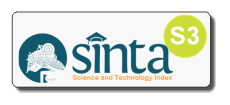Growth Mindset and Grit: Examining the Academic Buoyancy of College Students Implementing Online Lectures
Abstract
One of the consequences felt by the world of education from the outbreak of the Coronavirus is that higher education institutions are required to apply online learning methods. Online learning itself has strengths, challenges, and obstacles in its implementation. Therefore, students need the ability to overcome the obstacles and challenges that are felt in the daily online learning process, namely academy buoyancy. This research seeks to find the role of the growth mindset and grit in academic buoyancy in college students who face online lectures. This research involved 140 students who were in their first year when this research was conducted (class of 2021). The results of hypothesis testing using multiple regression analysis showed an F value equal to 19.597 with a p-value equal to 0.000 (p less than 0.5). These results indicate that the hypothesis in this study is accepted, that the growth mindset and grit have a role in academic buoyancy among students who are studying online. The results of further calculations show that the role of the growth mindset and grit on academic buoyancy is 22.2 percent (R2 equals 0.222).
Full Text:
PDFReferences
Adiwaty, M. R., & Fitriyah, Z. (2015). Efektivitas Strategi Penyesuaian Mahasiswa Baru pada Proses Pembelajaran di Perguruan Tinggi (Studi pada UPN “Veteran” Jawa Timur). Neo-Bis, 9(1), Article 1. https://doi.org/10.21107/nbs.v9i1.684
Aji, R. H. S. (2020). Dampak Covid-19 pada Pendidikan di Indonesia: Sekolah, Keterampilan, dan Proses Pembelajaran. SALAM: Jurnal Sosial Dan Budaya Syar-i, 7(2), Article 2. https://doi.org/10.15408/sjsbs.v7i5.15314
Anderson, R. C., Beach, P. T., Jacovidis, J. N., & Chadwick, K. L. (2020). Academic Buoyancy and Resilience for Diverse Students Around the World. Bethesda: International Baccalaureate Organization.
Astuti, P., & Febrian, F. (2019). Blended Learning Syarah: Bagaimana Penerapan dan Persepsi Mahasiswa. Jurnal Gantang, 4(2), Article 2. https://doi.org/10.31629/jg.v4i2.1560
Aulia, N. W., & Aina, M. (2016). Pengembangan Multimedia Interaktif Menggunakan Camtasia Studio 8 pada Pembelajaran Biologi Materi Kultur Jaringan untuk Siswa SMA Kelas XI MIA. BIODIK, 2(1), Article 1. https://doi.org/10.22437/bio.v2i1.3365
Baticulon, R. E., Sy, J. J., Alberto, N. R. I., Baron, M. B. C., Mabulay, R. E. C., Rizada, L. G. T., Tiu, C. J. S., Clarion, C. A., & Reyes, J. C. B. (2021). Barriers to Online Learning in the Time of COVID-19: A National Survey of Medical Students in the Philippines. Medical Science Educator, 31(2), 615–626. https://doi.org/10.1007/s40670-021-01231-z
Broda, M., Yun, J., Schneider, B., Yeager, D. S., Walton, G. M., & Diemer, M. (2018). Reducing Inequality in Academic Success for Incoming College Students: A Randomized Trial of Growth Mindset and Belonging Interventions. Journal of Research on Educational Effectiveness, 11(3), 317–338. https://doi.org/10.1080/19345747.2018.1429037
Burnette, J. L., O’Boyle, E. H., VanEpps, E. M., Pollack, J. M., & Finkel, E. J. (2013). Mind-sets matter: A meta-analytic review of implicit theories and self-regulation. Psychological Bulletin, 139(3), 655–701. https://doi.org/10.1037/a0029531
Collie, R. J., Martin, A. J., Malmberg, L.-E., Hall, J., & Ginns, P. (2015). Academic Buoyancy, Student’s Achievement, and the Linking Role of Control: A Cross-Lagged Analysis of High School Students. British Journal of Educational Psychology, 85(1), 113–130. https://doi.org/10.1111/bjep.12066
Data Vaksinasi COVID-19 (Update per 11 Maret 2021). (2021). Covid19.go.id. https://covid19.go.id/artikel/2021/03/11/data-vaksinasi-covid-19-update-11-maret-2021
Duckworth, A. L., Peterson, C., Matthews, M. D., & Kelly, D. R. (2007). Grit: Perseverance and Passion for Long-Term Goals. Journal of Personality and Social Psychology, 92(6), 1087–1101. https://doi.org/10.1037/0022-3514.92.6.1087
Dweck, C. S. (2006). Mindset. New York: Random House.
Dweck, C. S. (2015, September 23). Carol Dweck Revisits the “Growth Mindset.” Education Week. https://www.edweek.org/leadership/opinion-carol-dweck-revisits-the-growth-mindset/2015/09
Dweck, C. S., & Yeager, D. S. (2019). Mindsets: A View From Two Eras. Perspectives on Psychological Science, 14(3), 481–496. https://doi.org/10.1177/1745691618804166
Estiane, U. (2015). Pengaruh Dukungan Sosial Sahabat Terhadap Penyesuaian Sosial Mahasiswa Baru Di Lingkungan Perguruan Tinggi. Jurnal Psikologi Klinis dan Kesehatan Mental, 4(1), 29–40. https://journal.unair.ac.id/JPKK@pengaruh-dukungan-sosial-sahabat-terhadap-penyesuaian-sosial-mahasiswa-baru-di-lingkungan-perguruan-tinggi-article-8845-media-51-category-10.html
Farrington, C. A., Roderick, M., Allensworth, E., Nagaoka, J., Keyes, T. S., Johnson, D. W., & Beechum, N. O. (2012). Teaching Adolescents to Become Learners: The Role of Noncognitive Factors in Shaping School Performance--A Critical Literature Review. In Consortium on Chicago School Research (p. 108) [Non-Journal]. Consortium on Chicago School Research. https://eric.ed.gov/?id=ED542543
Fong, C. J., & Kim, Y. W. (2021). A Clash of Constructs? Re-examining Grit in Light of Academic Buoyancy and Future Time Perspective. Current Psychology, 40(4), 1824–1837. https://doi.org/10.1007/s12144-018-0120-4
Goldschmidt, K. (2020). The COVID-19 Pandemic: Technology use to Support the Wellbeing of Children. Journal of Pediatric Nursing: Nursing Care of Children and Families, 53, 88–90. https://doi.org/10.1016/j.pedn.2020.04.013
Heine, S. J., Kitayama, S., Lehman, D. R., Takata, T., Ide, E., Leung, C., & Matsumoto, H. (2001). Divergent Consequences of Success and Failure in Japan and North America: An Investigation of Self-Improving Motivations and Malleable Selves. Journal of Personality and Social Psychology, 81(4), 599–615. https://doi.org/10.1037/0022-3514.81.4.599
Hochanadel, A., & Finamore, D. (2015). Fixed And Growth Mindset In Education And How Grit Helps Students Persist In The Face Of Adversity. Journal of International Education Research (JIER), 11(1), Article 1. https://doi.org/10.19030/jier.v11i1.9099
Howlett, D., Vincent, T., Gainsborough, N., Fairclough, J., Taylor, N., Cohen, J., & Vincent, R. (2009). Integration of a Case-Based Online Module into an Undergraduate Curriculum: What is Involved and is it Effective? E-Learning and Digital Media, 6(4), 372–384. https://doi.org/10.2304/elea.2009.6.4.372
Jacovidis, J. N., Anderson, R. C., Beach, P. T., & Chadwick, K. L. (2020). Growth Mindset Thinking and Beliefs in Teaching and Learning. Bethesda: International Baccalaureate Organization.
Jamaluddin, D., Ratnasih, T., Gunawan, H., & Paujiah, E. (2020). Pembelajaran Daring Masa Pandemik Covid-19 pada Calon Guru: Hambatan, Solusi dan Proyeksi. Lembaga Penelitian Dan Pengabdian Kepada Masyarakat UIN Sunan Gunung Djati Bandung, 1–10.
MacIntyre, P. D. (2016). So Far So Good: An Overview of Positive Psychology and Its Contributions to SLA. In D. Gabryś-Barker & D. Gałajda (Eds.), Positive Psychology Perspectives on Foreign Language Learning and Teaching (pp. 3–20). New York: Springer.
Martin, A. J. (2013). Academic Buoyancy and Academic Resilience: Exploring ‘Everyday’ and ‘Classic’ Resilience in the Face of Academic Adversity. School Psychology International, 34(5), 488–500. https://doi.org/10.1177/0143034312472759
Martin, A. J., Colmar, S. H., Davey, L. A., & Marsh, H. W. (2010). Longitudinal Modelling of Academic Buoyancy and Motivation: Do the ‘5Cs’ Hold Up Over Time? The British Journal of Educational Psychology, 80(Pt 3), 473–496. https://doi.org/10.1348/000709910X486376
Martin, A. J., Ginns, P., Papworth, B., & Nejad, H. (2013). The Role of Academic Buoyancy in Aboriginal/Indigenous Students’ Educational Intentions: Sowing the Early Seeds of Success for Post-school Education and Training. In Seeding Success in Indigenous Australian Higher Education (Vol. 14, pp. 57–79). Bingley: Emerald Group Publishing Limited. https://doi.org/10.1108/S1479-3644(2013)0000014003
Martin, A. J., & Marsh, H. W. (2006). Academic Resilience and Its Psychological and Educational Correlates: A Construct Validity Approach. Psychology in the Schools, 43(3), 267–281. https://doi.org/10.1002/pits.20149
Martin, A. J., & Marsh, H. W. (2008). Academic Buoyancy: Towards an Understanding of Students’ Everyday Academic Resilience. Journal of School Psychology, 46(1), 53–83. https://doi.org/10.1016/j.jsp.2007.01.002
Maulana, Z. F., Soleha, T. U., Saftarina, F., & Siagian, J. M. C. (2014). Perbedaan Tingkat Stres antara Mahasiswa Tahun Pertama dan Tahun Kedua di Fakultas Kedokteran Universitas Lampung. Jurnal Majority, 3(4), Article 4. https://juke.kedokteran.unila.ac.id/index.php/majority/article/view/255
Miller, S., Connolly, P., & Maguire, L. K. (2013). Wellbeing, Academic Buoyancy and Educational Achievement in Primary School Students. International Journal of Educational Research, 62, 239–248. https://doi.org/10.1016/j.ijer.2013.05.004
Moawad, R. A. (2020). Online Learning during the COVID- 19 Pandemic and Academic Stress in University Students. Revista Romaneasca Pentru Educatie Multidimensionala, 12(1Sup2), Article 1Sup2. https://doi.org/10.18662/rrem/12.1sup2/252
Moore, J. L., Dickson-Deane, C., & Galyen, K. (2011). e-Learning, online learning, and distance learning environments: Are they the same? The Internet and Higher Education, 14(2), 129–135. https://doi.org/10.1016/j.iheduc.2010.10.001
Mosanya, M. (2021). Buffering Academic Stress during the COVID-19 Pandemic Related Social Isolation: Grit and Growth Mindset as Protective Factors against the Impact of Loneliness. International Journal of Applied Positive Psychology, 6(2), 159–174. https://doi.org/10.1007/s41042-020-00043-7
Mrazek, A. J., Ihm, E. D., Molden, D. C., Mrazek, M. D., Zedelius, C. M., & Schooler, J. W. (2018). Expanding Minds: Growth Mindsets of Self-Regulation and the Influences on Effort and Perseverance. Journal of Experimental Social Psychology, 79, 164–180. https://doi.org/10.1016/j.jesp.2018.07.003
Naserly, M. K. (2020). Implementasi Zoom, Google Classroom, dan WhatsApp Group dalam Mendukung Pembelajaran Daring (Online) pada Mata Kuliah Bahasa Inggris Lanjut (Studi Kasus pada 2 Kelas Semester 2, Jurusan Administrasi Bisnis, Fakultas Ekonomi dan Bisnis, Universitas Bina Sarana Informatika Jakarta). Aksara Public, 4(5), 155–165.
Oktovia, W., Zulharman, & Risma, D. (2013). Hubungan Kecerdasan Emosional Dengan Tingkat Stres Pada Mahasiswa Tahun Pertama Fakultas Kedokteran Universitas Riau. Universitas Riau. https://repository.unri.ac.id/xmlui/handle/123456789/2229
Rhew, E., Piro, J. S., Goolkasian, P., & Cosentino, P. (2018). The Effects of a Growth Mindset on Self-Efficacy and Motivation. Cogent Education, 5(1), 1492337. https://doi.org/10.1080/2331186X.2018.1492337
Sadikin, A., & Hamidah, A. (2020). Pembelajaran Daring di Tengah Wabah Covid-19: (Online Learning in the Middle of the Covid-19 Pandemic). BIODIK, 6(2), Article 2. https://doi.org/10.22437/bio.v6i2.9759
Sari, S. P., Aryansah, J. E., & Sari, K. (2020). Resiliensi Mahasiswa dalam Menghadapi Pandemi Covid 19 dan Implikasinya terhadap Proses Pembelajaran. Indonesian Journal of Guidance and Counseling: Theory and Application, 9(1), Article 1. https://doi.org/10.15294/ijgc.v9i1.38674
Smiley, P. A., Buttitta, K. V., Chung, S. Y., Dubon, V. X., & Chang, L. K. (2016). Mediation Models of Implicit Theories and Achievement Goals Predict Planning and Withdrawal After Failure. Motivation and Emotion, 40(6), 878–894. https://doi.org/10.1007/s11031-016-9575-5
Smith, M. (2015, August 17). From Adversity to Buoyancy. The British Psychological Society. https://www.bps.org.uk/psychologist/adversity-buoyancy
Symes, W., Putwain, D. W., & Remedios, R. (2015). The Enabling and Protective Role of Academic Buoyancy in the Appraisal of Fear Appeals Used Prior to High Stakes Examinations. School Psychology International, 36, 605–619. https://doi.org/10.1177/0143034315610622
Waite, A. (2016). How Can Motivation to Learn Science Be Improved? [Master’s thesis, University of Oxford]. https://ora.ox.ac.uk/objects/uuid:322f2480-e41c-407a-a243-8826126edd2b
Yeager, D. S., & Dweck, C. S. (2012). Mindsets That Promote Resilience: When Students Believe That Personal Characteristics Can Be Developed. Educational Psychologist, 47(4), 302–314. https://doi.org/10.1080/00461520.2012.722805
Yeager, D. S., & Dweck, C. S. (2020). What Can Be Learned From Growth Mindset Controversies? American Psychologist, 75, 1269–1284. https://doi.org/10.1037/amp0000794
DOI: http://dx.doi.org/10.17977/um023v12i12023p70-80
Refbacks
- There are currently no refbacks.
Copyright (c) 2023 Jurnal Sains Psikologi

This work is licensed under a Creative Commons Attribution 4.0 International License.
Reference Manager :
|
Aliansi:
Plagiarism Checker :
This work is licensed under a Creative Commons Attribution 4.0 International License.



1.png)








